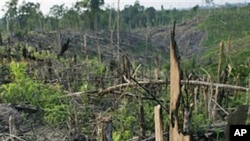The international community will gather next week in Cancun to negotiate an agreement to curb man-made climate change. While there are fears that goal will not be met, some countries already are implementing part of the plan - by reducing emissions due to deforestation and degradation. Heavily forested countries such as Indonesia hope to see more progress on the effort in Cancun.
Indonesia boasts almost 1 million square kilometers of forests, the second-largest in the world after Brazil's. The World Bank estimates that if the world put a monetary value on the carbon stored in trees, Indonesia could earn up to $2 billion a year by selling carbon credits.
Jakarta is getting ready for the plan, known as REDD for reducing emissions from deforestation and degradation. There are several pilot projects throughout the archipelago, and earlier this year the Russian company Gazprom bought the first carbon credits from a REDD project.
Agus Purnomo is the head of the Indonesian Climate Change Council:
"This shows that despite all the challenges that we are trying to overcome on good governance issues, on availability of resources, on expertise and whatnot, there are real opportunities of making things happen," said Purnomo.
Most climate experts say that greenhouse gases, such as carbon dioxide, released by burning oil and coal, contribute to warming temperatures. To reduce the warming, countries are negotiating a binding plan to cut emissions.
For some nations, that will mean reducing the use of fossil fuels. But in heavily forested countries, such as Indonesia, it could mean protecting forests, which absorb carbon dioxide.
But the REDD plan has problems that need smoothing out, mostly due to poor governance in developing countries. For example, there is the question of how to guarantee that the carbon credits sold will not be wiped out by illegal logging. Environmental group Greenpeace warns that corruption also could reduce the benefits.
Nonetheless, Norway has committed $1 billion for Indonesia to protect its forests. Purnomo says this show of confidence has helped the country to start reforming its forest management.
"It's just like when you want to make a turn on a tanker ship: it will take several days to do a real turn," said Purnomo. "For us, it will mean several months to make a change. But the seriousness, the efforts, the consultations, the designs that have been put in place in the last two months is amazing. It's unprecedented"
In January, Indonesia begins a two year moratorium on new permits to clear natural forest.
Agus Sari, who heads Indonesian operations for the U.S. company Sustainable Conservation, says the progress made is not yet enough for a large carbon market to take off.
"We are probably 25 percent toward what we should have had in terms of good governance, but you know, it's 25 percent more than it used to [be]," said Sari. "But I think time-wise it is not too bad because if REDD was ready now, I don't think Indonesia would be ready"
Many taking part in climate negotiations see REDD as one of the least controversial points and they expect to make headway on implementing the program during the Cancun summit. But it might still be a few years before carbon credits from forests are sold widely.
Indonesia Hopes to Sell Carbon Credits for Its Forests




